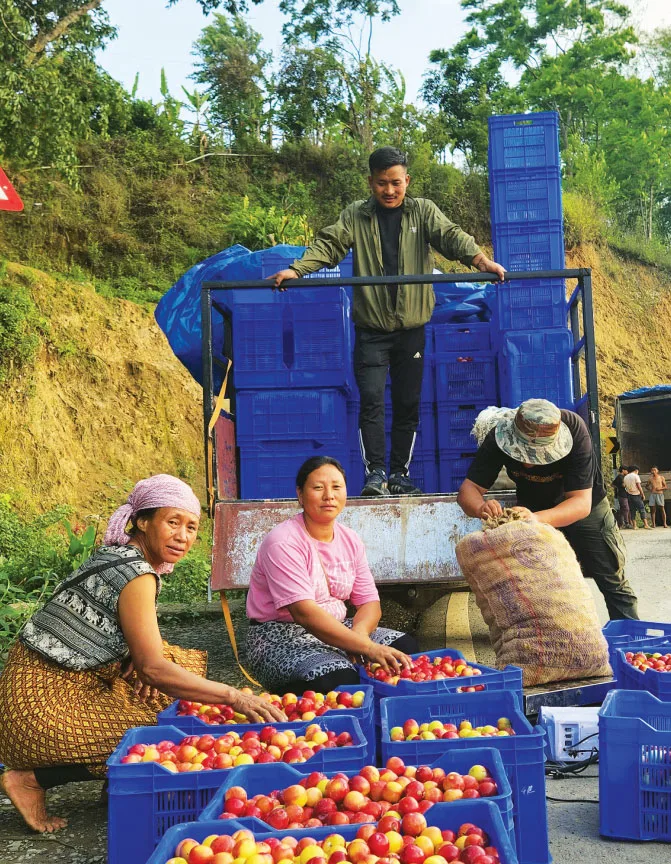
Fruitful all around
An organisation of women farmers in Nagaland’s Phek district is blending a lucrative business in exotic fruits with empowerment and inclusivity
The women of Pfutsero in Nagaland’s Phek district play a big role in agriculture. While the men do the heavy lifting — tilling the field or clearing the forest — traditionally it is the women who select, prepare and transplant the seeds and saplings, manage water resources, and help with harvesting. In many families, they are also responsible for the animal husbandry duties.
It was a significant step to turn these women into farmers and entrepreneurs. All it needed was the right kind of support. That was provided in 2021 by the Northeast Initiative Development Agency (NEIDA), a partner organisation of the Tata Trusts, which helped set up the Kade Farmer Producer Organisation (FPO). This all-women enterprise has 650 member-shareholders from eight villages in the area, is run by a chief executive, and has a board of directors.
Kade — which in the local Khezha language means large and expansive — is also the name of a place that is central to all eight villages: a small junction that gave the FPO its name.
In Pfutsero, small-scale farmers had struggled for years with market isolation, fluctuating prices and limited access to resources. The Kade FPO was born out of the farmers’ determination to collectively and collaboratively improve their lot by securing a considerable bump in their household incomes.
“About 80 or 90% of the households here have been subsistence farmers for generations, growing only what they require for their own consumption,” says Tekhewetsolu Wezah, cluster coordinator for NEIDA’s livelihoods project in Phek. “What else were they to do when they have small plots, with only a portion of this cultivable?”

A scarcity of water has led farmers here to depend mainly on the monsoons, with rain-fed crops suffering in the dry season. To top that, poor roads and infrastructure had confined the farmers to the local markets, where they were forced to sell their produce in bulk at lower rates.
The Kade FPO changed all that. With strategic planning and collective effort, it began to break down traditional barriers, enabling women farmers to access better markets within and outside Nagaland. With training and guidance, the farmers learned to negotiate, package and brand their products, turning raw potential into real value.
Cash in the crop
First, the FPO encouraged them to grow cash crops and scale up production. Says Julia Soto, chief executive of the Kade FPO: “Earlier, it was the middleman who would buy our produce, and we could only reach markets within the district. After coming together, we have been able to send our products to neighbouring Manipur and, from last year, to metros like Delhi and Bengaluru as well.”
The products Ms Soto refers to are an assortment of exotic and in-demand fruits that the FPO members grow, among them kiwi, gooseberry, persimmon, plums, wild apples and apricots.
Says 31-year-old Kukhrunulu Khamo, who lives in Porba village in Pfutsero: “We sell the fruits in large numbers and, if we have any left over, we process them into jams, preservatives and candy. These last longer and have found takers in the metro cities of India. In this way, our post-harvest losses are also reduced.”
NEIDA has played a crucial role in all of this. “NEIDA has supported us in many ways,” says Ms Soto. “It has shown us how to grow exotic fruits, with a package of practices that ensure we get bumper crops. We were taught about disease and pest management, packaging and branding, and provided solar dryers for processing.”
Farmers, who would earlier dig canals to channel water into their fields, are now banking on NEIDA’s irrigation initiatives: the digging of ponds and building jalkunds (water tanks). “We helped the FPO identify clusters of five or six farmers, then provided each group with a shared irrigation structure they could use,” adds Ms Wezah.
Women have always played an important role in family and community life in Naga society. But this doesn’t necessarily translate into decision-making powers. That is changing.
They mean business
- The Kade FPO has 650+ members from eight villages in the Pfutsero subdivision
- Its turnover in the 2022-25 period was ₹4.3 million
- The FPO’s main products are exotic fruits, high-value vegetables, and processed items like fruit candy, jams and vegetable pickles
- Members have market access to Kohima and Dimapur within Nagaland, as well as to Manipur, Delhi and Bengaluru
A remarkable thing about the Kade FPO is its multi-generational character. The age of its farmer-producers ranges from 20 to 75 years, which means there are several mother-daughter units (even some grandmothers) working together.
For Ms Khamo, the FPO has given her a voice. She became a shareholder in 2022 and a board member shortly after. “I’m often invited for training programmes where we are taught not just to develop ourselves as better farmers, but also as entrepreneurs,” she says.
It helps that Ms Khamo is a local success story. Before joining the FPO, her household income from cultivating vegetables and rearing pigs and poultry was ₹167,00 a year. Today she makes ₹30,000-40,000 from growing vegetables alone, and her annual income has jumped to about ₹230,000.
“The Kade FPO has given me a platform for a better life,” says Ms Khamo. “It has also given me credibility as a farmer and recognition and respect from my community. Best of all, it has turned me into a leader.”